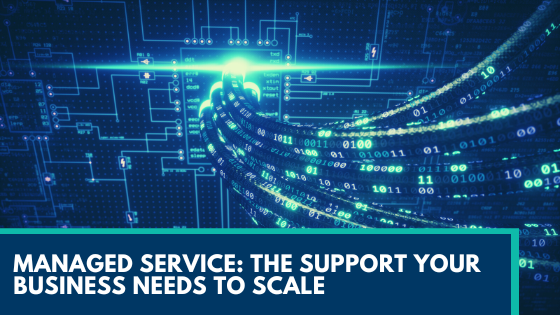Managed service isn’t just a popular buzzword. Managed services can level the
playing field by providing SMBs with access to the same expertise and support that
larger companies have, thus enabling them to improve their operations and compete
more effectively. But unfortunately, most people do not comprehend what these
mean apart from providing benefits over traditional break-fix repairs.
Managed Service Explained
With managed services, a 3rd party service provider takes complete responsibility for most
IT aspects of a company, removing the headache arising from potential data loss or similar
incidents. Think of managed services as, ‘’outsourcing your house’s maintenance instead of
doing it yourself.’’
The market for managed services will reach USD 311 billion by 2027, highlighting their
surging demand and significance.

How Managed Services Make IT Accessible for SMBs?
Small- and large-scale enterprises’ reliance on IT to grow has only increased with time.
However, some businesses find it difficult to scale due to limited resources, scrambling to fix
even petty issues that become too big to handle. Managed services work on resolving
problems even before they arise – adopting a Pre-emptive vs reactive approach while
partnering with a business as their shadow IT department. Since most managed services
charge on the number of devices, users, or services selected, they are much more affordable
than operating a separate department.
Managed Services: 3 Key Benefits to Know
1- Scalability
A managed service removes many price tags associated with scaling up, for instance, hiring,
training and purchasing new tech, providing room for scalability and maximum flexibility.
2- Reduced Downtimes
An ‘’n’’ number of failures can cause disruptions such as server downtimes, including cyberattacks (43% of cyber-attacks usually target small businesses). An in-house team may be illequipped to deal with downtimes as efficiently as a managed services provider specializing
in dealing with similar IT issues.
3- Technology Upgradation
Continuous equipment updates or investing in newer tech can be a significant bottleneck for
any organization. However, with managed services, a provider ensures the upkeep and is
responsible for deploying the best practices at no additional cost.
The Two Key Criteria For Choosing The Right Managed Services Provider
Taking maximum advantage of a managed services provider depends on whether you have
performed the necessary due diligence to select the right vendor.
These two factors should be kept under consideration:
• Industry Experience
Partnering with a managed service provider that has adequate industry experience is
essential. A thorough experience dealing with regulatory requirements and a previous track
record indicates they are well-suited to provide the best possible IT support.
• Level of Support
The most important factor when choosing managed services provider is the level of support
that you expect. Each managed services provider offers varying levels of support. Some
provide 24/7 support, while some offer support only during working hours.
Get a Managed Service or Be Managed
Managed services make IT accessible for businesses of all sizes because they can provide the
same expertise and support for a fraction of the cost. Post-pandemic managed IT services
have become more crucial. But companies hesitant to invest in a managed service provider
risk being overwhelmed by their IT issues and falling behind the competition.

